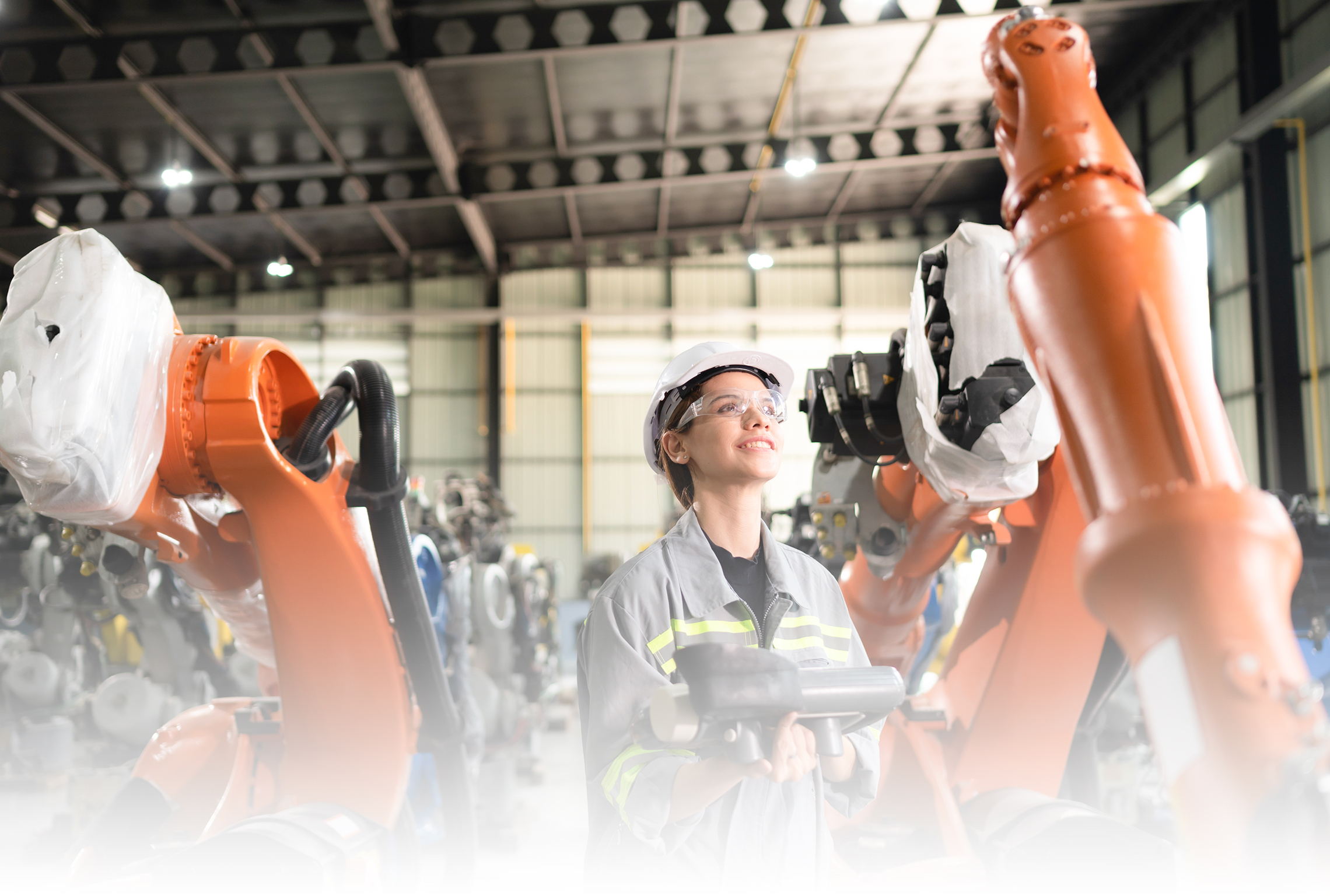The Role of AI in Engineering Innovation
AI in engineering can apply to any part of the engineering spectrum - from generative AI to predictive analytics.
Engineering
February 26, 2024
10 minutes read

“”
AI stands out as an emerging trend in engineering due to its customization capacities. The customization capabilities of AI enable engineers to deliver personalized solutions to their clients or companies.
AI in enginneering refers not only to the applications of artificial intelligence in different engineering contexts, but also about an engineering discipline in itself. When talking about AI in engineering and referring to the use of artificial intelligence in different engineering contexts, we have to be aware that they can apply to any part of the engineering spectrum – from generative AI to predictive analytics. Keep reading to learn how AI is redefining innovative technology in engineering.
What is the use of AI in engineering?
Artificial intelligence in engineering can have a plethora of applications in most engineering disciplines. The most common applications for AI in engineering are:
Generative design: Artificial intelligence leverages machine learning and learns optimization techniques to get in different design spaces. This can help engineers to generate innovative and efficient designs that might take less time then traditional methods. This technique is often used in mechanical engineering for example, because it can help engineers test functionalities before building them.
Design Optimization: AI algorithms can analyze vast amounts of data to optimize the design of engineering systems and components. This can lead to improved efficiency, performance, and cost-effectiveness.
Error prevention: AI-powered predictive analytics can anticipate equipment failures and maintenance needs in advance. This helps engineers schedule maintenance activities more efficiently and prevent costly downtime.
Autonomous Systems: AI enables the development of autonomous engineering systems such as self-driving vehicles, drones, and robots, like robotic arms. This applications can perform tasks in hazardous or inaccessible environments without human intervention. This has been seen in the International Space Station, for example, where they have a mechanical arm to access the outside of the spaceship.
Simulation and Modeling: AI techniques like machine learning can enhance simulation and modelling capabilities. This allows engineers to simulate complex scenarios, predict outcomes, and optimize designs more accurately. In Formula 1 engineers apply digital twins during testing sessions to predict how the cars will act during the actual race.
Process Optimization: AI algorithms can analyze manufacturing processes in real-time, identifying inefficiencies, optimizing parameters, and improving overall productivity and quality.
Risk Management: AI-powered analytics can assess and mitigate risks in engineering projects by analyzing historical data, identifying potential hazards, and providing recommendations for risk mitigation strategies.
What is AI in engineering?
AI engineering involves the development, implementation, and optimization of AI algorithms, models, and systems to solve complex engineering problems and improve engineering processes. AI engineering can encompass various disciplines within engineering, including mechanical engineering, electrical engineering, civil engineering, aerospace engineering, and more. Besides that, AI can be an engineering discipline in itself.
AI engineering involves tasks such as designing and developing AI algorithms and models tailored to specific engineering applications. The integrating AI technologies into engineering systems and processes to enhance performance, efficiency, and automation is another one of AI’s applications in engineering,
Utilizing AI techniques such as machine learning, natural language processing, and optimization algorithms to analyze data, make predictions, and optimize engineering designs and operations.
Collaborating with interdisciplinary teams of engineers, data scientists, and domain experts to leverage AI technologies effectively in engineering projects.
Ensuring the ethical and responsible use of AI in engineering applications, including considerations such as bias mitigation, transparency, and accountability.
Overall, AI engineering plays a crucial role in advancing the capabilities, efficiency, and innovation of engineering practices across various industries and domains.
What is the job of an AI engineer?
An AI engineer is a professional who specializes in designing, developing, and implementing artificial intelligence solutions and systems. An AI engineer should possess a deep understanding of AI technologies, algorithms, and methodologies. Moreover, they must show relevant expertise in software engineering, data science, and machine learning. The roles and responsibilities of an AI engineer can include:
Algorithm Development: This is creating and optimizing AI algorithms and models to solve specific problems or tasks.
Software Development: Writing code and developing software applications to implement AI solutions.
Data Processing and Analysis: Collecting, cleaning, and preprocessing data to train AI models. It also includes analyzing datasets to extract meaningful insights and patterns.
Machine Learning: Applying machine learning techniques to train AI models using supervised, unsupervised, or reinforcement learning approaches, and fine-tuning models to improve performance.
Deployment and Integration: Deploying AI models into production environments, integrating them with existing systems or applications, and ensuring scalability, reliability, and performance.
Testing and Validation: Conducting rigorous testing, validation, and evaluation of AI systems to ensure they meet performance requirements, are robust to variations, and generalize well to unseen data.
Research and Innovation: Staying updated with the latest advancements in AI research, experimenting with new techniques and technologies, and contributing to the development of innovative AI solutions.
Overall, an AI engineer plays a critical role in leveraging AI technologies to address complex problems, drive innovation, and create value across various industries and domains.
What are the benefits of engineering service providers for AI in engineering?
Engineering service providers offer several benefits for the implementation of AI in engineering. Usually, when companies are trying to expand their engineering scope, engineering consulting is a good starting point. This is due to their strong expertise in different fields, making them a string bet when expanding efforts.
Specialized Expertise: Engineering service providers often have teams of highly skilled professionals with expertise in both engineering principles and AI technologies. This specialized knowledge allows them to develop tailored AI solutions that address specific engineering challenges effectively.
Cost-effectiveness: Outsourcing AI engineering tasks to service providers can be more cost-effective than hiring and training in-house AI engineers. Service providers often offer flexible pricing models, allowing companies to scale AI projects according to their budget and requirements.
Faster Time-to-Market: Engineering service providers typically have experience in implementing AI solutions across various industries and domains. Their established workflows, tools, and methodologies can accelerate the development and deployment of AI systems.
Access to Advanced Tools and Technologies: Engineering service providers invest in state-of-the-art tools, software, and infrastructure for AI development and deployment. By leveraging these resources, companies can access advanced AI capabilities without the need for significant upfront investment.
Scalability: Engineering service providers can scale AI projects up or down based on demand. This allows companies to adjust resources and capacity according to changing business needs. This scalability is particularly beneficial for projects with fluctuating workloads or short-term requirements.
Risk Mitigation: By partnering with experienced engineering service providers, companies can mitigate risks associated with AI implementation. This risks include technical challenges, regulatory compliance, and data privacy concerns. Service providers often have robust quality assurance processes and compliance measures in place to ensure the reliability and security of AI systems.
Focus on Core Competencies: Outsourcing AI engineering tasks to service providers allows companies to focus on their core competencies and strategic objectives. By offloading AI development and maintenance to external experts, companies can allocate resources more efficiently and concentrate on innovation and growth initiatives.
Continuous Support and Maintenance: Engineering service providers offer ongoing support and maintenance services for AI systems, ensuring optimal performance, reliability, and scalability over time. This continuous support helps companies maximize the value of their AI investments and adapt to evolving business requirements.
How is AI motivating engineering innovation?
AI is propelling engineering innovation forward through various means. By leveraging AI algorithms, engineers can efficiently analyze large datasets, extracting valuable insights to inform decision-making and identify opportunities for improvement. For example, automation powered by AI streamlines repetitive tasks. This enables engineers to focus on more creative and strategic endeavors, thus accelerating the pace of innovation.
Another example of AI in engineering is the application of predictive analytics. These analytics facilitated by AI can anticipate future trends and issues based on historical data. This empowers engineers to proactively address challenges and optimize resource allocation.
Other AI techniques such as machine learning and optimization drive engineers to tackle complex problems that were previously daunting. The use of these techniques can lead to the development of innovative solutions across diverse engineering domains.
Above all, AI stands out as an emerging technology in engineering due to its customization capacities. The customization capabilities of AI enable engineers to deliver personalized solutions to their clients or companies. Tailoring solutions to individual user needs, drives greater customer satisfaction and fosters new avenues for innovation.
Through continuous learning and adaptation, AI systems evolve over time, ensuring that engineering solutions remain relevant and effective in addressing evolving requirements and challenges. This way, artificial intelligence in engineering can help companies stay relevant and ahead of the game when it comes to streamlining processes or creating new and improved services and products.







